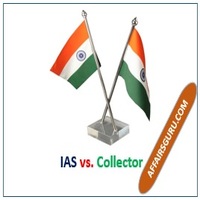
For easy understanding of a candidates, difference between an IAS and a Collector are given below.
IAS vs Collector
- According to understanding the difference by name, district collector looks after administration of district whereas IAS (Indian Administrative Service) is related to a kind of grade ‘A’ post in UPSC in its respect.
- District collector is also abbreviated as Collector. Candidate can also say the collector as an Indian Administrative Service (IAS) officer who is in-charge of revenue collection and administration of district magistrate. Considered the premier civil service of India, the IAS is one of three arms of All India Services (along with Indian Police Service (IPS) and Indian Forest Service (IFS). Member of these three services serve the Government of India as well as individual states. IAS may also be deployed to various public sector undertakings.
- Warren Hastings introduced the office of district collector in 1772. Sir George Champbell, lieutenant governor of Bengal from 1871-1874 controlled authority over all departments in each district. IAS is formally known as Imperial Civil Service (ICS) who is the administrative arm of the All India Service. ICS now known as IAS was found in 1858. Name change from ICS to IAS was done in 26 Jan 1950.
- As district collector are senior-most executive magistrate in the district, this post is also referred to as district magistrate. As the office-bearer works under the supervision of a divisional commissioner, this post is also known as deputy commissioner.
- It is not mandatory that one will become D.C after joining IAS. In simple term, you can be an IAS without being DC, however reverse is not true.
- They are posted by the state government, from among the pool of Indian Administrative Service (IAS) officers, who either are on Level 11 or Level 12 of the Pay Matrix, in the state. The members of the IAS are either directly recruited by the Union Public Service Commission or promoted from Provincial Civil Service (PCS).
Responsibility of an IAS Officer
An IAS officer perform the following typical functions.
- To collect revenue and function as court officials in matters of revenue and crime.
- To maintain law and order, to implement union and state government policies at the grass-roots level when posted to field positions i.e. sub-divisional magistrates, additional district magistrates, district magistrates and divisional commissioners and to act as an agent of the government in the field, i.e. to act as an intermediary between the public and the government.
- To handle the administration and daily proceedings of the government, including the formulation and implementation of policy in consultation with the minister-in-charge of a specific ministry or department.
- To contribute to policy formulation, and to make a final decision in certain matters, with the agreement of the minister concerned or the council of ministers (depending upon the weight of the matter), when posted at the higher level in the Government of India as a joint secretary, additional secretary, special secretary or secretary equivalent, secretary and Cabinet Secretary, and in state governments as principal secretary, additional chief secretary or special chief secretary and chief secretary
Function and Responsibility of a Collector
Responsibilities assigned to a district magistrate change from state to state. However, district collectors are entrusted with a wide range of duties in the jurisdiction of the district generally involving the following –
As Collector – Responsibilities & Functionalities
- Conducts revenue court
- Land assessment
- Land acquisition
- Collection
- Collection of income tax dues, excise duties, irrigation dues etc.
- Distribution of agricultural loans
- Chairman of the district bankers’ coordination committee
- Head of the district industries centre
As district magistrate (DM) – Responsibilities & Functionalities
- Conducts criminal court of executive magistrate.
- Maintenance of law and order.
- Supervision of the police and jails.
- Supervision of subordinate executive magistracy and conduct magisterial inquiries.
- Hearing cases under the preventive section of the Criminal Procedure Code.
- Supervision of jails and certification of execution of capital sentences.
- Arbitrator of land acquisition.
- Disaster management during natural calamities such as floods, famines or epidemics.
- Crisis management during riots or external aggression.
As deputy commissioner/district commissioner – Responsibilities & Functionalities
- Reports to divisional commissioner on all matters.
As district election officer – Responsibilities & Functionalities
- Conducts elections in the district, be it general, assembly or municipal.
- Acts as the returning officer for the Lok Sabha constituency in the district.
Salary of IAS & Collector
Candidate can check the salary of IAS and Collector by clicking on below link.
IAS Officer Salary and Perks After 7th Pay Commission
All the best for your exam
You can join or visit at Facebook Page or Twitter for always keep in touch with further updates.
Read More Article…

Sir mujhe ias banana h aur aapki helpchahiye